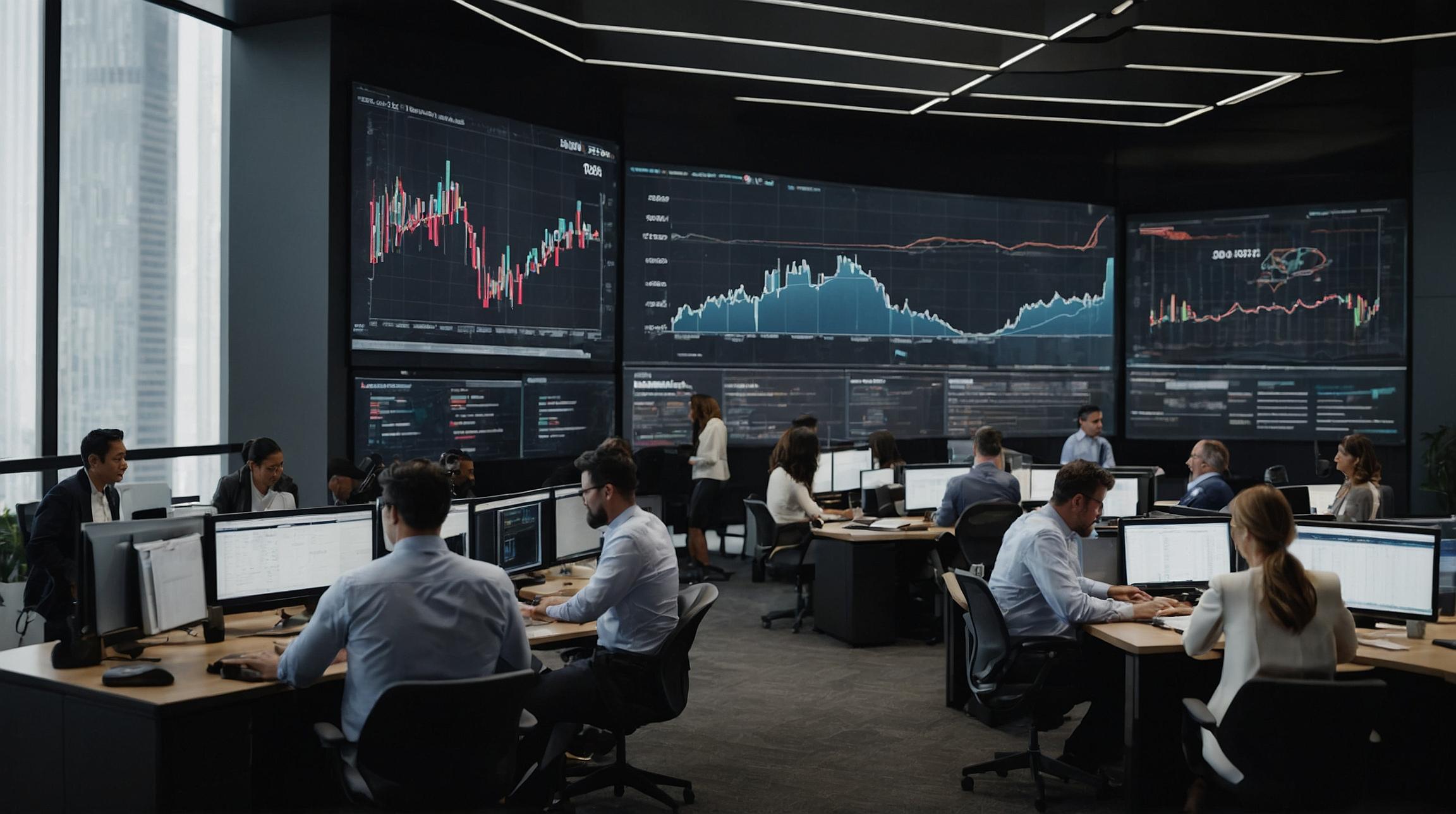The Trump administration’s imposition of a $100,000 fee on new H-1B visas marks a significant shift in U.S. immigration policy impacting the technology sector. While intended to prioritize high-value roles, this policy risks stifling startup innovation and ceding critical talent to global competitors. !-- wp:paragraph -->
Contents
FinOracleAI — Market ViewImplications for American Innovation and CompetitivenessFinOracleAI — Market ViewImplications for American Innovation and CompetitivenessFinOracleAI — Market ViewImplications for American Innovation and CompetitivenessFinOracleAI — Market ViewImplications for American Innovation and CompetitivenessFinOracleAI — Market ViewGlobal Talent Competition IntensifiesImplications for American Innovation and CompetitivenessFinOracleAI — Market ViewGlobal Talent Competition IntensifiesImplications for American Innovation and CompetitivenessFinOracleAI — Market ViewGlobal Talent Competition IntensifiesImplications for American Innovation and CompetitivenessFinOracleAI — Market ViewGlobal Talent Competition IntensifiesImplications for American Innovation and CompetitivenessFinOracleAI — Market ViewDiverging Views Among Tech ExecutivesGlobal Talent Competition IntensifiesImplications for American Innovation and CompetitivenessFinOracleAI — Market ViewDiverging Views Among Tech ExecutivesGlobal Talent Competition IntensifiesImplications for American Innovation and CompetitivenessFinOracleAI — Market ViewTech Sector’s Deep Reliance on H-1B VisasDiverging Views Among Tech ExecutivesGlobal Talent Competition IntensifiesImplications for American Innovation and CompetitivenessFinOracleAI — Market ViewTech Sector’s Deep Reliance on H-1B VisasDiverging Views Among Tech ExecutivesGlobal Talent Competition IntensifiesImplications for American Innovation and CompetitivenessFinOracleAI — Market ViewTrump Administration’s H-1B Visa Fee Sparks Industry AlarmTech Sector’s Deep Reliance on H-1B VisasDiverging Views Among Tech ExecutivesGlobal Talent Competition IntensifiesImplications for American Innovation and CompetitivenessFinOracleAI — Market View
- Opportunities: Potentially streamlines visa distribution toward higher-wage, specialized positions, reducing lottery randomness.
- Risks: Exorbitant fees could deter startups from hiring top foreign talent, weakening U.S. tech innovation.
- May accelerate talent migration to competing tech hubs in China, Canada, and Europe.
- Could discourage foreign students from pursuing education and careers in the U.S., diminishing the talent pipeline.
- Large tech firms may adapt through offshoring or acquisitions, but smaller companies face disproportionate challenges.
“America’s competitive advantage has always been the ability to attract the best talent from around the world. Limiting that ability is illogical,” Tusk said.FinOracleAI — Market View
The Trump administration’s imposition of a $100,000 fee on new H-1B visas marks a significant shift in U.S. immigration policy impacting the technology sector. While intended to prioritize high-value roles, this policy risks stifling startup innovation and ceding critical talent to global competitors. !-- wp:paragraph -->- Opportunities: Potentially streamlines visa distribution toward higher-wage, specialized positions, reducing lottery randomness.
- Risks: Exorbitant fees could deter startups from hiring top foreign talent, weakening U.S. tech innovation.
- May accelerate talent migration to competing tech hubs in China, Canada, and Europe.
- Could discourage foreign students from pursuing education and careers in the U.S., diminishing the talent pipeline.
- Large tech firms may adapt through offshoring or acquisitions, but smaller companies face disproportionate challenges.
Implications for American Innovation and Competitiveness
Critics argue that the new fee undermines America’s historic advantage in attracting global talent. Bradley Tusk, CEO of Tusk Venture Partners, called the changes “terrible,” emphasizing that access to international talent is essential for maintaining U.S. leadership in technology. !-- wp:paragraph -->“America’s competitive advantage has always been the ability to attract the best talent from around the world. Limiting that ability is illogical,” Tusk said.FinOracleAI — Market View
The Trump administration’s imposition of a $100,000 fee on new H-1B visas marks a significant shift in U.S. immigration policy impacting the technology sector. While intended to prioritize high-value roles, this policy risks stifling startup innovation and ceding critical talent to global competitors. !-- wp:paragraph -->- Opportunities: Potentially streamlines visa distribution toward higher-wage, specialized positions, reducing lottery randomness.
- Risks: Exorbitant fees could deter startups from hiring top foreign talent, weakening U.S. tech innovation.
- May accelerate talent migration to competing tech hubs in China, Canada, and Europe.
- Could discourage foreign students from pursuing education and careers in the U.S., diminishing the talent pipeline.
- Large tech firms may adapt through offshoring or acquisitions, but smaller companies face disproportionate challenges.
Implications for American Innovation and Competitiveness
Critics argue that the new fee undermines America’s historic advantage in attracting global talent. Bradley Tusk, CEO of Tusk Venture Partners, called the changes “terrible,” emphasizing that access to international talent is essential for maintaining U.S. leadership in technology. !-- wp:paragraph -->“America’s competitive advantage has always been the ability to attract the best talent from around the world. Limiting that ability is illogical,” Tusk said.FinOracleAI — Market View
The Trump administration’s imposition of a $100,000 fee on new H-1B visas marks a significant shift in U.S. immigration policy impacting the technology sector. While intended to prioritize high-value roles, this policy risks stifling startup innovation and ceding critical talent to global competitors. !-- wp:paragraph -->- Opportunities: Potentially streamlines visa distribution toward higher-wage, specialized positions, reducing lottery randomness.
- Risks: Exorbitant fees could deter startups from hiring top foreign talent, weakening U.S. tech innovation.
- May accelerate talent migration to competing tech hubs in China, Canada, and Europe.
- Could discourage foreign students from pursuing education and careers in the U.S., diminishing the talent pipeline.
- Large tech firms may adapt through offshoring or acquisitions, but smaller companies face disproportionate challenges.
Implications for American Innovation and Competitiveness
Critics argue that the new fee undermines America’s historic advantage in attracting global talent. Bradley Tusk, CEO of Tusk Venture Partners, called the changes “terrible,” emphasizing that access to international talent is essential for maintaining U.S. leadership in technology. !-- wp:paragraph -->“America’s competitive advantage has always been the ability to attract the best talent from around the world. Limiting that ability is illogical,” Tusk said.FinOracleAI — Market View
The Trump administration’s imposition of a $100,000 fee on new H-1B visas marks a significant shift in U.S. immigration policy impacting the technology sector. While intended to prioritize high-value roles, this policy risks stifling startup innovation and ceding critical talent to global competitors. !-- wp:paragraph -->- Opportunities: Potentially streamlines visa distribution toward higher-wage, specialized positions, reducing lottery randomness.
- Risks: Exorbitant fees could deter startups from hiring top foreign talent, weakening U.S. tech innovation.
- May accelerate talent migration to competing tech hubs in China, Canada, and Europe.
- Could discourage foreign students from pursuing education and careers in the U.S., diminishing the talent pipeline.
- Large tech firms may adapt through offshoring or acquisitions, but smaller companies face disproportionate challenges.
Implications for American Innovation and Competitiveness
Critics argue that the new fee undermines America’s historic advantage in attracting global talent. Bradley Tusk, CEO of Tusk Venture Partners, called the changes “terrible,” emphasizing that access to international talent is essential for maintaining U.S. leadership in technology. !-- wp:paragraph -->“America’s competitive advantage has always been the ability to attract the best talent from around the world. Limiting that ability is illogical,” Tusk said.FinOracleAI — Market View
The Trump administration’s imposition of a $100,000 fee on new H-1B visas marks a significant shift in U.S. immigration policy impacting the technology sector. While intended to prioritize high-value roles, this policy risks stifling startup innovation and ceding critical talent to global competitors. !-- wp:paragraph -->- Opportunities: Potentially streamlines visa distribution toward higher-wage, specialized positions, reducing lottery randomness.
- Risks: Exorbitant fees could deter startups from hiring top foreign talent, weakening U.S. tech innovation.
- May accelerate talent migration to competing tech hubs in China, Canada, and Europe.
- Could discourage foreign students from pursuing education and careers in the U.S., diminishing the talent pipeline.
- Large tech firms may adapt through offshoring or acquisitions, but smaller companies face disproportionate challenges.
Global Talent Competition Intensifies
The U.S. technology sector is engaged in fierce competition worldwide, particularly in artificial intelligence development. The new H-1B visa fee risks pushing top-tier talent toward countries like China, Canada, and India, which are aggressively courting skilled professionals. !-- wp:paragraph --> Steven Hubbard, data scientist at the American Immigration Council, noted, “This policy gives competitors an advantage in attracting the talent crucial for innovation.” !-- wp:paragraph --> China, in particular, is a formidable rival, having recently introduced AI advancements that challenge U.S. dominance. The visa changes may accelerate the migration of foreign students and professionals toward these emerging tech ecosystems. !-- wp:paragraph --> Cornell Tech’s Greg Morrisett warned, “Uncertainty over visa policies discourages foreign students from studying in the U.S., bolstering China and India’s startup environments.” !-- wp:paragraph -->Implications for American Innovation and Competitiveness
Critics argue that the new fee undermines America’s historic advantage in attracting global talent. Bradley Tusk, CEO of Tusk Venture Partners, called the changes “terrible,” emphasizing that access to international talent is essential for maintaining U.S. leadership in technology. !-- wp:paragraph -->“America’s competitive advantage has always been the ability to attract the best talent from around the world. Limiting that ability is illogical,” Tusk said.FinOracleAI — Market View
The Trump administration’s imposition of a $100,000 fee on new H-1B visas marks a significant shift in U.S. immigration policy impacting the technology sector. While intended to prioritize high-value roles, this policy risks stifling startup innovation and ceding critical talent to global competitors. !-- wp:paragraph -->- Opportunities: Potentially streamlines visa distribution toward higher-wage, specialized positions, reducing lottery randomness.
- Risks: Exorbitant fees could deter startups from hiring top foreign talent, weakening U.S. tech innovation.
- May accelerate talent migration to competing tech hubs in China, Canada, and Europe.
- Could discourage foreign students from pursuing education and careers in the U.S., diminishing the talent pipeline.
- Large tech firms may adapt through offshoring or acquisitions, but smaller companies face disproportionate challenges.
Global Talent Competition Intensifies
The U.S. technology sector is engaged in fierce competition worldwide, particularly in artificial intelligence development. The new H-1B visa fee risks pushing top-tier talent toward countries like China, Canada, and India, which are aggressively courting skilled professionals. !-- wp:paragraph --> Steven Hubbard, data scientist at the American Immigration Council, noted, “This policy gives competitors an advantage in attracting the talent crucial for innovation.” !-- wp:paragraph --> China, in particular, is a formidable rival, having recently introduced AI advancements that challenge U.S. dominance. The visa changes may accelerate the migration of foreign students and professionals toward these emerging tech ecosystems. !-- wp:paragraph --> Cornell Tech’s Greg Morrisett warned, “Uncertainty over visa policies discourages foreign students from studying in the U.S., bolstering China and India’s startup environments.” !-- wp:paragraph -->Implications for American Innovation and Competitiveness
Critics argue that the new fee undermines America’s historic advantage in attracting global talent. Bradley Tusk, CEO of Tusk Venture Partners, called the changes “terrible,” emphasizing that access to international talent is essential for maintaining U.S. leadership in technology. !-- wp:paragraph -->“America’s competitive advantage has always been the ability to attract the best talent from around the world. Limiting that ability is illogical,” Tusk said.FinOracleAI — Market View
The Trump administration’s imposition of a $100,000 fee on new H-1B visas marks a significant shift in U.S. immigration policy impacting the technology sector. While intended to prioritize high-value roles, this policy risks stifling startup innovation and ceding critical talent to global competitors. !-- wp:paragraph -->- Opportunities: Potentially streamlines visa distribution toward higher-wage, specialized positions, reducing lottery randomness.
- Risks: Exorbitant fees could deter startups from hiring top foreign talent, weakening U.S. tech innovation.
- May accelerate talent migration to competing tech hubs in China, Canada, and Europe.
- Could discourage foreign students from pursuing education and careers in the U.S., diminishing the talent pipeline.
- Large tech firms may adapt through offshoring or acquisitions, but smaller companies face disproportionate challenges.
Global Talent Competition Intensifies
The U.S. technology sector is engaged in fierce competition worldwide, particularly in artificial intelligence development. The new H-1B visa fee risks pushing top-tier talent toward countries like China, Canada, and India, which are aggressively courting skilled professionals. !-- wp:paragraph --> Steven Hubbard, data scientist at the American Immigration Council, noted, “This policy gives competitors an advantage in attracting the talent crucial for innovation.” !-- wp:paragraph --> China, in particular, is a formidable rival, having recently introduced AI advancements that challenge U.S. dominance. The visa changes may accelerate the migration of foreign students and professionals toward these emerging tech ecosystems. !-- wp:paragraph --> Cornell Tech’s Greg Morrisett warned, “Uncertainty over visa policies discourages foreign students from studying in the U.S., bolstering China and India’s startup environments.” !-- wp:paragraph -->Implications for American Innovation and Competitiveness
Critics argue that the new fee undermines America’s historic advantage in attracting global talent. Bradley Tusk, CEO of Tusk Venture Partners, called the changes “terrible,” emphasizing that access to international talent is essential for maintaining U.S. leadership in technology. !-- wp:paragraph -->“America’s competitive advantage has always been the ability to attract the best talent from around the world. Limiting that ability is illogical,” Tusk said.FinOracleAI — Market View
The Trump administration’s imposition of a $100,000 fee on new H-1B visas marks a significant shift in U.S. immigration policy impacting the technology sector. While intended to prioritize high-value roles, this policy risks stifling startup innovation and ceding critical talent to global competitors. !-- wp:paragraph -->- Opportunities: Potentially streamlines visa distribution toward higher-wage, specialized positions, reducing lottery randomness.
- Risks: Exorbitant fees could deter startups from hiring top foreign talent, weakening U.S. tech innovation.
- May accelerate talent migration to competing tech hubs in China, Canada, and Europe.
- Could discourage foreign students from pursuing education and careers in the U.S., diminishing the talent pipeline.
- Large tech firms may adapt through offshoring or acquisitions, but smaller companies face disproportionate challenges.
“It will mean H1-B is used just for very high value jobs, which will mean no lottery needed, and more certainty for those jobs,” Hastings said on social media. Altman added, “Streamlining the process and providing financial incentives seems beneficial to attract the smartest people.”
!-- wp:paragraph --> However, many experts and startup leaders strongly oppose the fee. Adam Kovacevich, CEO of the Chamber of Progress, highlighted the prohibitive cost for startups, stating, “You’re not going to find many startups willing to pay $100,000 per H-1B, in addition to salary.”
!-- wp:paragraph --> Y Combinator CEO Garry Tan criticized the fee as a “massive gift” to overseas tech hubs, warning that it “kneecaps startups” amid a critical AI development race.
!-- wp:paragraph -->Global Talent Competition Intensifies
The U.S. technology sector is engaged in fierce competition worldwide, particularly in artificial intelligence development. The new H-1B visa fee risks pushing top-tier talent toward countries like China, Canada, and India, which are aggressively courting skilled professionals. !-- wp:paragraph --> Steven Hubbard, data scientist at the American Immigration Council, noted, “This policy gives competitors an advantage in attracting the talent crucial for innovation.” !-- wp:paragraph --> China, in particular, is a formidable rival, having recently introduced AI advancements that challenge U.S. dominance. The visa changes may accelerate the migration of foreign students and professionals toward these emerging tech ecosystems. !-- wp:paragraph --> Cornell Tech’s Greg Morrisett warned, “Uncertainty over visa policies discourages foreign students from studying in the U.S., bolstering China and India’s startup environments.” !-- wp:paragraph -->Implications for American Innovation and Competitiveness
Critics argue that the new fee undermines America’s historic advantage in attracting global talent. Bradley Tusk, CEO of Tusk Venture Partners, called the changes “terrible,” emphasizing that access to international talent is essential for maintaining U.S. leadership in technology. !-- wp:paragraph -->“America’s competitive advantage has always been the ability to attract the best talent from around the world. Limiting that ability is illogical,” Tusk said.FinOracleAI — Market View
The Trump administration’s imposition of a $100,000 fee on new H-1B visas marks a significant shift in U.S. immigration policy impacting the technology sector. While intended to prioritize high-value roles, this policy risks stifling startup innovation and ceding critical talent to global competitors. !-- wp:paragraph -->- Opportunities: Potentially streamlines visa distribution toward higher-wage, specialized positions, reducing lottery randomness.
- Risks: Exorbitant fees could deter startups from hiring top foreign talent, weakening U.S. tech innovation.
- May accelerate talent migration to competing tech hubs in China, Canada, and Europe.
- Could discourage foreign students from pursuing education and careers in the U.S., diminishing the talent pipeline.
- Large tech firms may adapt through offshoring or acquisitions, but smaller companies face disproportionate challenges.
Diverging Views Among Tech Executives
Some leaders, including Netflix co-founder Reed Hastings and OpenAI CEO Sam Altman, have expressed support for the new fee, arguing it will prioritize high-value positions and reduce uncertainty in visa allocation. !-- wp:paragraph -->“It will mean H1-B is used just for very high value jobs, which will mean no lottery needed, and more certainty for those jobs,” Hastings said on social media. Altman added, “Streamlining the process and providing financial incentives seems beneficial to attract the smartest people.”
!-- wp:paragraph --> However, many experts and startup leaders strongly oppose the fee. Adam Kovacevich, CEO of the Chamber of Progress, highlighted the prohibitive cost for startups, stating, “You’re not going to find many startups willing to pay $100,000 per H-1B, in addition to salary.”
!-- wp:paragraph --> Y Combinator CEO Garry Tan criticized the fee as a “massive gift” to overseas tech hubs, warning that it “kneecaps startups” amid a critical AI development race.
!-- wp:paragraph -->Global Talent Competition Intensifies
The U.S. technology sector is engaged in fierce competition worldwide, particularly in artificial intelligence development. The new H-1B visa fee risks pushing top-tier talent toward countries like China, Canada, and India, which are aggressively courting skilled professionals. !-- wp:paragraph --> Steven Hubbard, data scientist at the American Immigration Council, noted, “This policy gives competitors an advantage in attracting the talent crucial for innovation.” !-- wp:paragraph --> China, in particular, is a formidable rival, having recently introduced AI advancements that challenge U.S. dominance. The visa changes may accelerate the migration of foreign students and professionals toward these emerging tech ecosystems. !-- wp:paragraph --> Cornell Tech’s Greg Morrisett warned, “Uncertainty over visa policies discourages foreign students from studying in the U.S., bolstering China and India’s startup environments.” !-- wp:paragraph -->Implications for American Innovation and Competitiveness
Critics argue that the new fee undermines America’s historic advantage in attracting global talent. Bradley Tusk, CEO of Tusk Venture Partners, called the changes “terrible,” emphasizing that access to international talent is essential for maintaining U.S. leadership in technology. !-- wp:paragraph -->“America’s competitive advantage has always been the ability to attract the best talent from around the world. Limiting that ability is illogical,” Tusk said.FinOracleAI — Market View
The Trump administration’s imposition of a $100,000 fee on new H-1B visas marks a significant shift in U.S. immigration policy impacting the technology sector. While intended to prioritize high-value roles, this policy risks stifling startup innovation and ceding critical talent to global competitors. !-- wp:paragraph -->- Opportunities: Potentially streamlines visa distribution toward higher-wage, specialized positions, reducing lottery randomness.
- Risks: Exorbitant fees could deter startups from hiring top foreign talent, weakening U.S. tech innovation.
- May accelerate talent migration to competing tech hubs in China, Canada, and Europe.
- Could discourage foreign students from pursuing education and careers in the U.S., diminishing the talent pipeline.
- Large tech firms may adapt through offshoring or acquisitions, but smaller companies face disproportionate challenges.
Diverging Views Among Tech Executives
Some leaders, including Netflix co-founder Reed Hastings and OpenAI CEO Sam Altman, have expressed support for the new fee, arguing it will prioritize high-value positions and reduce uncertainty in visa allocation. !-- wp:paragraph -->“It will mean H1-B is used just for very high value jobs, which will mean no lottery needed, and more certainty for those jobs,” Hastings said on social media. Altman added, “Streamlining the process and providing financial incentives seems beneficial to attract the smartest people.”
!-- wp:paragraph --> However, many experts and startup leaders strongly oppose the fee. Adam Kovacevich, CEO of the Chamber of Progress, highlighted the prohibitive cost for startups, stating, “You’re not going to find many startups willing to pay $100,000 per H-1B, in addition to salary.”
!-- wp:paragraph --> Y Combinator CEO Garry Tan criticized the fee as a “massive gift” to overseas tech hubs, warning that it “kneecaps startups” amid a critical AI development race.
!-- wp:paragraph -->Global Talent Competition Intensifies
The U.S. technology sector is engaged in fierce competition worldwide, particularly in artificial intelligence development. The new H-1B visa fee risks pushing top-tier talent toward countries like China, Canada, and India, which are aggressively courting skilled professionals. !-- wp:paragraph --> Steven Hubbard, data scientist at the American Immigration Council, noted, “This policy gives competitors an advantage in attracting the talent crucial for innovation.” !-- wp:paragraph --> China, in particular, is a formidable rival, having recently introduced AI advancements that challenge U.S. dominance. The visa changes may accelerate the migration of foreign students and professionals toward these emerging tech ecosystems. !-- wp:paragraph --> Cornell Tech’s Greg Morrisett warned, “Uncertainty over visa policies discourages foreign students from studying in the U.S., bolstering China and India’s startup environments.” !-- wp:paragraph -->Implications for American Innovation and Competitiveness
Critics argue that the new fee undermines America’s historic advantage in attracting global talent. Bradley Tusk, CEO of Tusk Venture Partners, called the changes “terrible,” emphasizing that access to international talent is essential for maintaining U.S. leadership in technology. !-- wp:paragraph -->“America’s competitive advantage has always been the ability to attract the best talent from around the world. Limiting that ability is illogical,” Tusk said.FinOracleAI — Market View
The Trump administration’s imposition of a $100,000 fee on new H-1B visas marks a significant shift in U.S. immigration policy impacting the technology sector. While intended to prioritize high-value roles, this policy risks stifling startup innovation and ceding critical talent to global competitors. !-- wp:paragraph -->- Opportunities: Potentially streamlines visa distribution toward higher-wage, specialized positions, reducing lottery randomness.
- Risks: Exorbitant fees could deter startups from hiring top foreign talent, weakening U.S. tech innovation.
- May accelerate talent migration to competing tech hubs in China, Canada, and Europe.
- Could discourage foreign students from pursuing education and careers in the U.S., diminishing the talent pipeline.
- Large tech firms may adapt through offshoring or acquisitions, but smaller companies face disproportionate challenges.
Tech Sector’s Deep Reliance on H-1B Visas
The H-1B visa program, capped at 65,000 annual visas plus 20,000 for advanced degree holders, has been foundational for U.S. tech companies. Giants like Amazon, Microsoft, Meta, Apple, and Google employ thousands of H-1B visa holders, including prominent CEOs who once entered the U.S. workforce under this program. !-- wp:paragraph --> Though the White House clarified the $100,000 fee applies only to new visas and not renewals, the financial burden is substantial, especially for startups with limited resources. !-- wp:paragraph -->Diverging Views Among Tech Executives
Some leaders, including Netflix co-founder Reed Hastings and OpenAI CEO Sam Altman, have expressed support for the new fee, arguing it will prioritize high-value positions and reduce uncertainty in visa allocation. !-- wp:paragraph -->“It will mean H1-B is used just for very high value jobs, which will mean no lottery needed, and more certainty for those jobs,” Hastings said on social media. Altman added, “Streamlining the process and providing financial incentives seems beneficial to attract the smartest people.”
!-- wp:paragraph --> However, many experts and startup leaders strongly oppose the fee. Adam Kovacevich, CEO of the Chamber of Progress, highlighted the prohibitive cost for startups, stating, “You’re not going to find many startups willing to pay $100,000 per H-1B, in addition to salary.”
!-- wp:paragraph --> Y Combinator CEO Garry Tan criticized the fee as a “massive gift” to overseas tech hubs, warning that it “kneecaps startups” amid a critical AI development race.
!-- wp:paragraph -->Global Talent Competition Intensifies
The U.S. technology sector is engaged in fierce competition worldwide, particularly in artificial intelligence development. The new H-1B visa fee risks pushing top-tier talent toward countries like China, Canada, and India, which are aggressively courting skilled professionals. !-- wp:paragraph --> Steven Hubbard, data scientist at the American Immigration Council, noted, “This policy gives competitors an advantage in attracting the talent crucial for innovation.” !-- wp:paragraph --> China, in particular, is a formidable rival, having recently introduced AI advancements that challenge U.S. dominance. The visa changes may accelerate the migration of foreign students and professionals toward these emerging tech ecosystems. !-- wp:paragraph --> Cornell Tech’s Greg Morrisett warned, “Uncertainty over visa policies discourages foreign students from studying in the U.S., bolstering China and India’s startup environments.” !-- wp:paragraph -->Implications for American Innovation and Competitiveness
Critics argue that the new fee undermines America’s historic advantage in attracting global talent. Bradley Tusk, CEO of Tusk Venture Partners, called the changes “terrible,” emphasizing that access to international talent is essential for maintaining U.S. leadership in technology. !-- wp:paragraph -->“America’s competitive advantage has always been the ability to attract the best talent from around the world. Limiting that ability is illogical,” Tusk said.FinOracleAI — Market View
The Trump administration’s imposition of a $100,000 fee on new H-1B visas marks a significant shift in U.S. immigration policy impacting the technology sector. While intended to prioritize high-value roles, this policy risks stifling startup innovation and ceding critical talent to global competitors. !-- wp:paragraph -->- Opportunities: Potentially streamlines visa distribution toward higher-wage, specialized positions, reducing lottery randomness.
- Risks: Exorbitant fees could deter startups from hiring top foreign talent, weakening U.S. tech innovation.
- May accelerate talent migration to competing tech hubs in China, Canada, and Europe.
- Could discourage foreign students from pursuing education and careers in the U.S., diminishing the talent pipeline.
- Large tech firms may adapt through offshoring or acquisitions, but smaller companies face disproportionate challenges.
Tech Sector’s Deep Reliance on H-1B Visas
The H-1B visa program, capped at 65,000 annual visas plus 20,000 for advanced degree holders, has been foundational for U.S. tech companies. Giants like Amazon, Microsoft, Meta, Apple, and Google employ thousands of H-1B visa holders, including prominent CEOs who once entered the U.S. workforce under this program. !-- wp:paragraph --> Though the White House clarified the $100,000 fee applies only to new visas and not renewals, the financial burden is substantial, especially for startups with limited resources. !-- wp:paragraph -->Diverging Views Among Tech Executives
Some leaders, including Netflix co-founder Reed Hastings and OpenAI CEO Sam Altman, have expressed support for the new fee, arguing it will prioritize high-value positions and reduce uncertainty in visa allocation. !-- wp:paragraph -->“It will mean H1-B is used just for very high value jobs, which will mean no lottery needed, and more certainty for those jobs,” Hastings said on social media. Altman added, “Streamlining the process and providing financial incentives seems beneficial to attract the smartest people.”
!-- wp:paragraph --> However, many experts and startup leaders strongly oppose the fee. Adam Kovacevich, CEO of the Chamber of Progress, highlighted the prohibitive cost for startups, stating, “You’re not going to find many startups willing to pay $100,000 per H-1B, in addition to salary.”
!-- wp:paragraph --> Y Combinator CEO Garry Tan criticized the fee as a “massive gift” to overseas tech hubs, warning that it “kneecaps startups” amid a critical AI development race.
!-- wp:paragraph -->Global Talent Competition Intensifies
The U.S. technology sector is engaged in fierce competition worldwide, particularly in artificial intelligence development. The new H-1B visa fee risks pushing top-tier talent toward countries like China, Canada, and India, which are aggressively courting skilled professionals. !-- wp:paragraph --> Steven Hubbard, data scientist at the American Immigration Council, noted, “This policy gives competitors an advantage in attracting the talent crucial for innovation.” !-- wp:paragraph --> China, in particular, is a formidable rival, having recently introduced AI advancements that challenge U.S. dominance. The visa changes may accelerate the migration of foreign students and professionals toward these emerging tech ecosystems. !-- wp:paragraph --> Cornell Tech’s Greg Morrisett warned, “Uncertainty over visa policies discourages foreign students from studying in the U.S., bolstering China and India’s startup environments.” !-- wp:paragraph -->Implications for American Innovation and Competitiveness
Critics argue that the new fee undermines America’s historic advantage in attracting global talent. Bradley Tusk, CEO of Tusk Venture Partners, called the changes “terrible,” emphasizing that access to international talent is essential for maintaining U.S. leadership in technology. !-- wp:paragraph -->“America’s competitive advantage has always been the ability to attract the best talent from around the world. Limiting that ability is illogical,” Tusk said.FinOracleAI — Market View
The Trump administration’s imposition of a $100,000 fee on new H-1B visas marks a significant shift in U.S. immigration policy impacting the technology sector. While intended to prioritize high-value roles, this policy risks stifling startup innovation and ceding critical talent to global competitors. !-- wp:paragraph -->- Opportunities: Potentially streamlines visa distribution toward higher-wage, specialized positions, reducing lottery randomness.
- Risks: Exorbitant fees could deter startups from hiring top foreign talent, weakening U.S. tech innovation.
- May accelerate talent migration to competing tech hubs in China, Canada, and Europe.
- Could discourage foreign students from pursuing education and careers in the U.S., diminishing the talent pipeline.
- Large tech firms may adapt through offshoring or acquisitions, but smaller companies face disproportionate challenges.
Trump Administration’s H-1B Visa Fee Sparks Industry Alarm
The Trump administration’s recent announcement of a $100,000 fee for new H-1B visas has sent shockwaves through the U.S. technology sector. This unprecedented fee targets employers seeking to hire highly skilled foreign professionals, a group that has long been integral to America’s tech workforce and innovation ecosystem. !-- wp:paragraph --> Industry leaders and immigration experts warn that this policy change, effective from September 22, 2025, could severely disrupt talent acquisition for startups and smaller firms, potentially pushing global talent to rival countries. !-- wp:paragraph -->Tech Sector’s Deep Reliance on H-1B Visas
The H-1B visa program, capped at 65,000 annual visas plus 20,000 for advanced degree holders, has been foundational for U.S. tech companies. Giants like Amazon, Microsoft, Meta, Apple, and Google employ thousands of H-1B visa holders, including prominent CEOs who once entered the U.S. workforce under this program. !-- wp:paragraph --> Though the White House clarified the $100,000 fee applies only to new visas and not renewals, the financial burden is substantial, especially for startups with limited resources. !-- wp:paragraph -->Diverging Views Among Tech Executives
Some leaders, including Netflix co-founder Reed Hastings and OpenAI CEO Sam Altman, have expressed support for the new fee, arguing it will prioritize high-value positions and reduce uncertainty in visa allocation. !-- wp:paragraph -->“It will mean H1-B is used just for very high value jobs, which will mean no lottery needed, and more certainty for those jobs,” Hastings said on social media. Altman added, “Streamlining the process and providing financial incentives seems beneficial to attract the smartest people.”
!-- wp:paragraph --> However, many experts and startup leaders strongly oppose the fee. Adam Kovacevich, CEO of the Chamber of Progress, highlighted the prohibitive cost for startups, stating, “You’re not going to find many startups willing to pay $100,000 per H-1B, in addition to salary.”
!-- wp:paragraph --> Y Combinator CEO Garry Tan criticized the fee as a “massive gift” to overseas tech hubs, warning that it “kneecaps startups” amid a critical AI development race.
!-- wp:paragraph -->Global Talent Competition Intensifies
The U.S. technology sector is engaged in fierce competition worldwide, particularly in artificial intelligence development. The new H-1B visa fee risks pushing top-tier talent toward countries like China, Canada, and India, which are aggressively courting skilled professionals. !-- wp:paragraph --> Steven Hubbard, data scientist at the American Immigration Council, noted, “This policy gives competitors an advantage in attracting the talent crucial for innovation.” !-- wp:paragraph --> China, in particular, is a formidable rival, having recently introduced AI advancements that challenge U.S. dominance. The visa changes may accelerate the migration of foreign students and professionals toward these emerging tech ecosystems. !-- wp:paragraph --> Cornell Tech’s Greg Morrisett warned, “Uncertainty over visa policies discourages foreign students from studying in the U.S., bolstering China and India’s startup environments.” !-- wp:paragraph -->Implications for American Innovation and Competitiveness
Critics argue that the new fee undermines America’s historic advantage in attracting global talent. Bradley Tusk, CEO of Tusk Venture Partners, called the changes “terrible,” emphasizing that access to international talent is essential for maintaining U.S. leadership in technology. !-- wp:paragraph -->“America’s competitive advantage has always been the ability to attract the best talent from around the world. Limiting that ability is illogical,” Tusk said.FinOracleAI — Market View
The Trump administration’s imposition of a $100,000 fee on new H-1B visas marks a significant shift in U.S. immigration policy impacting the technology sector. While intended to prioritize high-value roles, this policy risks stifling startup innovation and ceding critical talent to global competitors. !-- wp:paragraph -->- Opportunities: Potentially streamlines visa distribution toward higher-wage, specialized positions, reducing lottery randomness.
- Risks: Exorbitant fees could deter startups from hiring top foreign talent, weakening U.S. tech innovation.
- May accelerate talent migration to competing tech hubs in China, Canada, and Europe.
- Could discourage foreign students from pursuing education and careers in the U.S., diminishing the talent pipeline.
- Large tech firms may adapt through offshoring or acquisitions, but smaller companies face disproportionate challenges.













